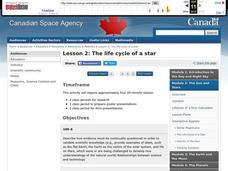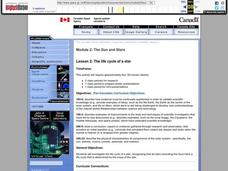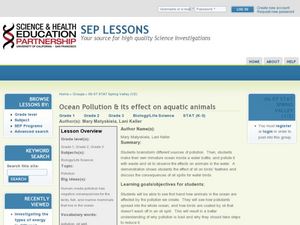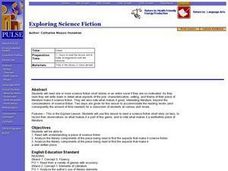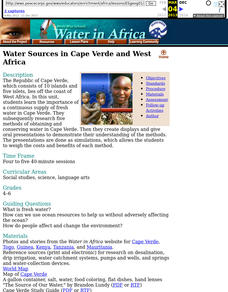Consortium for Ocean Science Exploration and Engagement (COSEE)
Arctic Smorgasbord
Though the walrus spends roughly one third of its time on land, it eats organisms that live on the bottom of the ocean. The first in a series of five, the lesson uses a variety of plant and animal cards to have scholars build an arctic...
Curated OER
A Bug's Life: Diary of an Insect's Metamorphosis
Fifth graders examine the stages of insect's to understand heredity. In this inherited traits lesson, 5th graders explore the life of the honeybee for its inherited traits. Students recognize the difference between inherited traits...
Curated OER
The Life Cycle of a Star
Students investigate the life cycle of a star and make conclusions based on evidence, research, and observation. In this lesson on space and scientific investigation, students describe the relationships between science and...
Curated OER
Frontier Life Story
Students undertake a similar (but not quite as drastic) adventure as that of Frontier House as they explore the day-to-day realities of frontier life through a Laura Ingalls Wilder story, and reflect on which time period suits them...
Curated OER
The Life Cycle of a Star
Learners investigate the life cycle of a star through research. Once research is complete, students prepare posters and present findings to class. Flash animation is included to help learners visualize life cycle of star researching.
Curated OER
Staying Young with Vitamin E
Investigate how Vitamin E is used to prevent cell aging. Young scientists coat the surface of apples and bananas with oil, Vitamin E, and water. They place each in a petri dish and cover them to observe oxidation over time. They answer 8...
Curated OER
Web of Life - Role-Playing
Students role-play how organisms adapt to their environment. They play 20 questions with plant and animal habitats. They create a web of life to demonstrate how each plant and animal relies on the other for survival.
Curated OER
Life Cycles
Using computers, Students work in small groups and progress through the roles of Explorer, Researcher, Designer, and Evaluator as they study the life cycle of plants, insects, butterflies and frogs.
Curated OER
Exploring Marine Ecosystems in the Caribbean and Maine
Students compare the marine habitats of Maine and the Caribbean using temperature, tides, ocean currents, latitude and longitude. In this marine ecosystems instructional activity, students analyze maps to complete graphic organizers that...
Curated OER
Life Cycle
Seventh graders make a collage of the human life cycle. In this life cycle lesson students study the human reproductive system and the general concepts of pregnancy. Students receive detailed information about the human life cycle and...
Curated OER
Investigating Ocean Life
Sixth graders explore the various forms of ocean life. They research a creature that lives in the ocean. Students use their research information to create a series of HyperStudio stacks about their sea creature.
Curated OER
Ocean Life Mural
Students conduct Internet research on ocean life, view pictures of sea life, and create a class ocean life mural.
Curated OER
Ocean Pollution & its Effect on Aquatic Animals
Young scholars consider the concept of ocean pollution. In this ocean lesson, students participate in a hands-on demonstration in order to replicate an oil spill and its effects on marine life.
Curated OER
Exploring Science Fiction
Twelfth graders read a variety of science fiction short stories. Using the text, they identify the components that make it science fiction and a well written piece of literature. They record their observations and share them with the...
Curated OER
The Journey of the Pacific Salmon
Students examine the journey of the Pacific salmon. In this salmon species lesson, students review the stages of the salmon life cycle and conduct an experiment to determine how the water and habitat changes during each stage.
Curated OER
Your Day as a Cycle
Fourth graders examine a variety of cycles. They take a look at life cycles of plants and animals, the cycle of the moon and tides, and other sequences of events in their daily lives. An interesting part of the lesson is how kids keep...
Curated OER
Flour Beetle
Students observe the life cycle of the common flour beetle and make observations of its life stages. They also design and implement an investigation on food preference for the beetle and record data over a period of several months....
Curated OER
Cycles and Starting Mealworms
Here is a fascinating lesson about the life cycles of plants and animals, and other cycles found in nature. Learners explore the cycle of the moon, the tides, and other sequences of events in every day life. The big activity is the...
Curated OER
Math for the Frontier
Make history come to life by using the Frontier House series to engage learners in the past. Your class will "prepare" for a trip to 1833 Montana. They will learn about homesteading, frontier life, inflation, and cost of living. Using...
Curated OER
Wind Power
What a wonderful way to explore wind power! Through this lesson, learners get a background in the history of wind power, create their own wind turbine, and the test their designs. This is a terrific way to tie scientific principles to...
Curated OER
Water Sources in Cape Verde and West Africa
Young explorers study the scarcity and importance of a continuous supply of fresh water in Cape Verde. They research the five main ways that fresh water is obtained in these countries. Each research group prepares a presentation, and...
Curated OER
Velocity of Traffic on Highway 26
Physics fanatics time five cars as they pass on the highway. They use the times and a 20-yard distance to calculate velocity. They also graph distance vs. time. A page of student pre-lab questions is provided in addition to the activity...
Curated OER
Selfless Service and The Giving Tree - Building Ethical Conscience
Upper elementary schoolers investigate philanthropy and selflessness by reading a children's book. In this ethics activity, they read The Giving Tree by Shel Silverstein, and research Mahatma Gandhi's troublesome, yet inspiring, life....
Teach Engineering
Clean it Up!
Harness the power of bacteria. Scholars see how using organisms that exist in nature can help solve human problems in the process known as bioremediation. They research and discuss several successful examples, such as using oil-eating...


